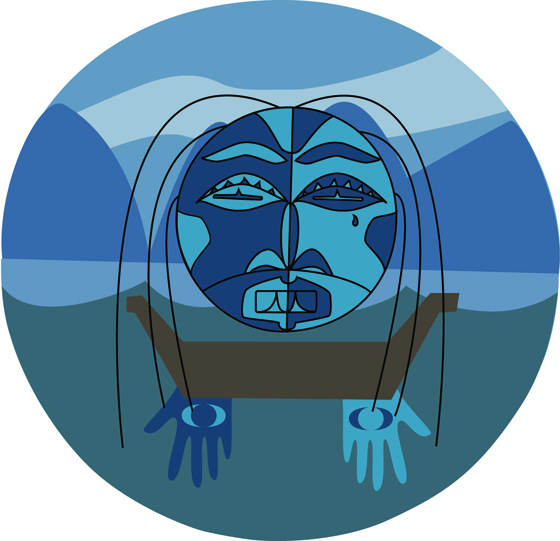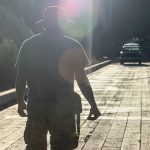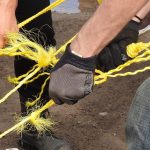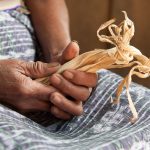Sisters Rising: Indigenous Resurgence and Kinship
Shantelle Moreno at the Sisters Rising mask-making workshop with Shíshálh artist Margaret Briere. Photo by Nicole Land.
By Sandrina de Finney
“My dream is that First Nations girls can walk home alone without fear.”
~ Sisters Rising participant
Since Europeans first invaded Turtle Island (also known as North America), incalculable brutality has been enacted on First Peoples, with girls and women as prime targets.
Findings from Canada’s Truth and Reconciliation Commission show that over centuries, colonial policies have sought to disenfranchise First Nations women from their Indigenous status, their community leadership roles and their access to housing and employment. As Anette Sikka writes, these policies “uprooted traditional spiritual and intellectual values accorded to Indigenous women and replaced them with notions of inferiority, hierarchy, and the paradigm of women as property.”
Recently, the United Nations alerted the world that Canada is facing an “epidemic” of gender-based violence against Indigenous girls and women that is rooted in this history of objectification and dehumanization. Indigenous girls and women experience the highest rates of sexual and racialized violence and exploitation, sex trafficking, incarceration, murder, poverty, under-housing, homelessness and underservicing in health and education.
Sisters Rising is a project based at the University of Victoria’s School of Child and Youth Care, which offers a platform to honour creative, community-generated interventions rooted in dignity, kinship, and land and body wellbeing. Its approach is informed by the experiences of Indigenous sisters, mothers, aunties, cousins, community members, kin and children. Its purpose is to re-centre teachings about gender and sexuality specific to communities.
Indigenous girls apprehended by the child welfare system are the victims of sexual violence more than twice as often as other girls in care and Indigenous two-spirit, gender fluid, queer and trans youth also face higher rates of gender-based and sexualized violence. The safety and well-being of Indigenous girls and youth are being jeopardized by insufficient practice, policy and legal responses.
With funding provided by the Social Sciences and Humanities Research Council and support from research partners Northwest Inter-Nation Family and Community Services Society, the Siem Smun’eem Indigenous Child Well-being Research Network and Networks for Change and Wellbeing, Sisters Rising is a response to the need for Indigenous-led action on gender-based violence. It is an arts-based, Indigenous research study with Indigenous girls, young women, and youth of all genders in Indigenous communities on B.C.’s west coast. The project focuses on challenging the victim-blaming climate of racialized gender violence by re-centring Indigenous values and teachings and linking body sovereignty to questions of decolonization and land sovereignty.
The team, which comes from a diversity of nations, is committed to “working in a good way” by following appropriate protocols with Elders and communities. Team members work with youth, Elders and front-line practitioners to explore sexualized and gender violence, land-based well-being and Indigenous resurgence.
Workshops, which are open to all self-identified native (Aboriginal, First Nations, Indigenous, Métis, Inuit) girls and young women, ages 13 to 26, and youth of all genders, have been held in the territories of Lkwungen, W̱SÁNEĆ, Haida, Kitamaat/Haisla, Tsawwassen, Cowichan, Tsimshian and other northern British Columbian communities. Artwork, storytelling and multi-media, including digital collages, photography and video, are used and topics explored have included participants’ visions for a strong community; supporting dignity, wellbeing and leadership; cultural healing; being on the land; healthy relationships; consent; secrecy; how, where and why sexualized violence happens; lateral and systemic violence; engaging with youth of all genders about sexual violence; and understanding and interrupting the historical colonial roots of sexual violence.
Service providers and knowledge keepers such as Elders are also invited to share insights into the historical roots of sexualized violence, as well as culturally congruent responses that promote well-being and dignity. In several workshops, Elders joined youth participants to share teachings about gender (such as coming-of-age ceremonies) and guided participants with stories and teachings related to their specific heritage, such as learning language, making family and clan crests, picking berries, making traditional wool headbands, weaving cedar and upholding stories. Elders shared that these practices are central to body and gender wellbeing.
In the past two years, participants and research staff (primarily Indigenous young adults) have presented at four international conferences, co-authored two academic journal articles, produced three videos and facilitated dozens of public presentations and workshops. What we have heard from participants is that fear, stigma, and lack of effective responses all perpetuate the silence and isolation that surround gender-based violence. In turn, silence and denial are rooted in persistent systemic barriers: High rates of intersecting gendered, sexualized and racialized poverty, lack of services and infrastructure, colonial policies such as the Indian Act and land appropriation, and continued colonial violence all perpetuate gender-based violence. In workshop after workshop, one important vision has been shared by participants: the need to honor community- and youth-generated responses that support inter-generational connections, the resurgence of Indigenous teachings of gender wellbeing, and self-determination over both bodies and homelands.
To our ancestors, communities, families and everyone who has contributed to Sisters Rising, we are so grateful. We raise our hands to our ancestors and all our relations, to those who have survived and to those who were stolen, and to all of those who grieve, resist and walk in dignity through pain and resurgence.

Sandrina de Finney is an associate professor and graduate advisor in the School of Child and Youth Care, University of Victoria (Lekwungen and W̱SÁNEĆ nations). Sandrina is a research advisor with the Siem Smun’eem Indigenous Child Welfare Research Network and the research lead for Sisters Rising: Honoring Indigenous Body and Land Sovereignty. In these roles she focuses on recentering land-based, customary caretaking practices for Indigenous families, and advocates for community-based Indigenous praxis in child welfare, foster care, adoptions, and youth and girlhood studies.




